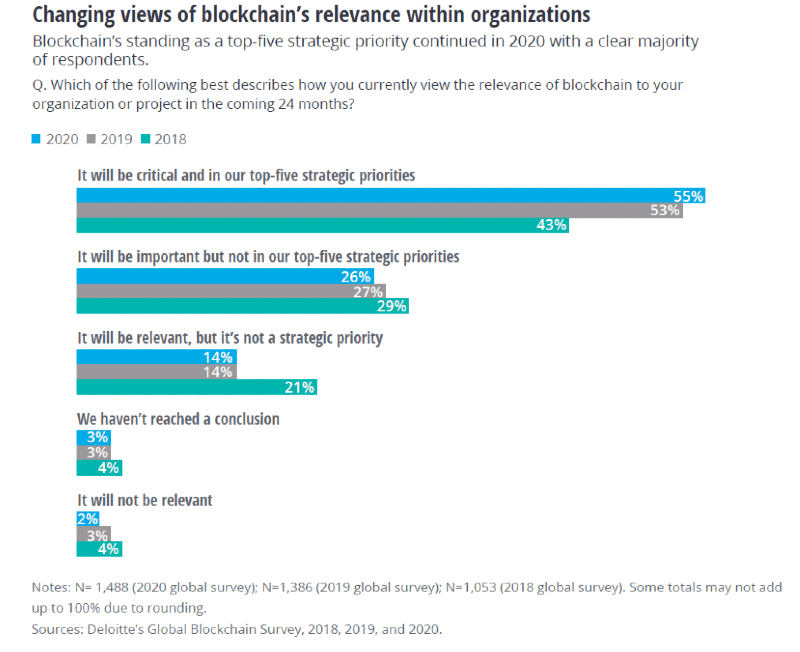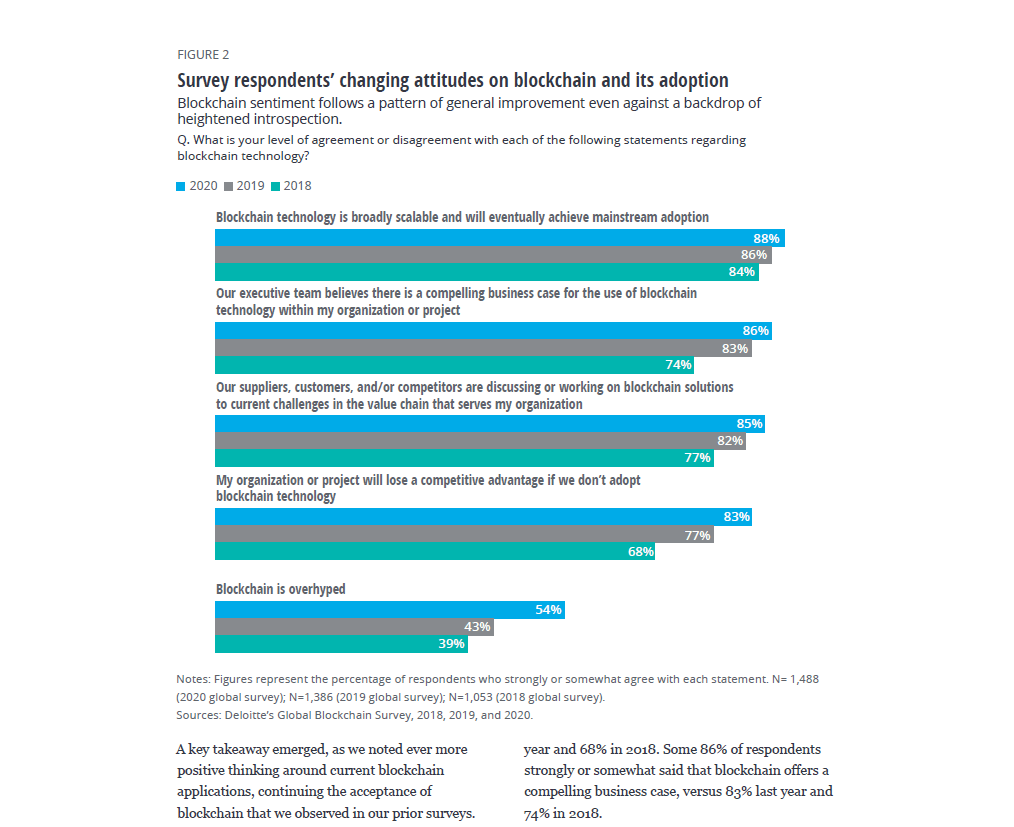Deloitte’s recently released 2020 Global Blockchain Survey has revealed that nearly 40 per cent of respondents already have Blockchain in production clearly showing the blockchain is gaining traction. The number of companies around the globe now driving to ignite their blockchain and digital asset integration is speeding up according to the recent survey.
Among the key survey findings:
- Thirty-nine per cent of global respondents have already incorporated blockchain into production. This is a significant increase from 23 per cent of respondents signalling production last year.
- Fifty-five per cent of responding organizations view blockchain as a top strategic priority, an increase from 53 per cent in 2019 and 43 per cent in 2018.
- Nearly 89 per cent of those surveyed believe that digital assets will be “very” or “somewhat” important to their industries in the next three years.
- Eighty-two per cent of respondents said that they are hiring staff with blockchain expertise or plan to do so within the next 12 months, compared to 73 per cent last year.
- Eighty-three per cent of respondents indicated their companies will lose competitive advantage if they don’t adopt blockchain (versus 77 per cent in 2019).
- Seventy per cent call the pace of regulatory change for blockchain and digital asset solutions as “very” or “somewhat” fast.
The survey polled a sample of 1,488 senior executives and practitioners in 14 countries (Brazil, Canada, China, Germany, Hong Kong, Ireland, Israel, Mexico, Singapore, South Africa, Switzerland, the United Arab Emirates, the United Kingdom, and the United States). Respondents had at least a broad understanding of blockchain, digital assets, and distributed ledger technology (DLT) and were familiar with and able to comment on their organizations’ blockchain and digital asset investment plans and perceptions, among other metrics.
“While blockchain was once classified as a technology experiment, it now represents a true agent of change that is affecting the entire organization,” said Linda Pawczuk, Principal, Global and US Consulting Leader for Blockchain and Digital Assets, Deloitte Consulting LLP. “Like many disruptive technologies, it has evolved from a merely promising and potentially groundbreaking approach to a now integral solution to organizational innovation. This year’s survey suggests that blockchain is solidly entrenched in the strategic thinking of organizations across industries, sectors and applications.”
“Our survey confirms what we see in the marketplace — a proliferation of digital assets used as a means of exchange, a store of value, digital representations of specific assets, or equity in a company,” said Rob Massey, Partner, Global and US Tax Leader for Blockchain and Digital Assets, Deloitte Tax LLP. “Digital assets are now enabling enhanced commercialization models across industries and geographies.”
This is further evidence confirming Blockchain’s maturity as a valid solution for many institutions and enterprises, and according to the report, business leaders are increasingly investing in blockchain and digital assets as a top-five strategic priority, with 66 per cent forecasting investments of $1 million or more in the next 12 months.

“The Deloitte Report is yet another affirmation in the growing body of research that underlines industry adoption of blockchain technology and digital assets. The substantial portion of respondents who already have blockchain in production in their organization highlights the growing maturity, but there’s still substantial work to be done.”
“As enterprises and institutions begin to consider how we will rebuild the global financial system following this pandemic, incremental progress is a luxury that we no longer have. Institutions and individuals need to be best equipped to manage financial risks, protect investments, and even grow our assets when the next crisis hits. “
“Widespread adoption of blockchain technology is a significant stepping stone in building a new system robust enough to cope with the challenges that lie ahead, and will reward innovators that take action today. This dramatic and rapid evolution of market structure toward decentralization is rapidly leaving the ifs, and becoming a when,” stated John Wu, President of AVA Labs.
Jackson Mueller, Director of Policy and Government Relations at Securrency added:
“The marked increase in the number of regulatory jurisdictions interested in or currently implementing responsible regulatory frameworks supportive of digital asset solutions is a welcome development. There are at least 23 regulatory authorities involved in these discussions, according to a Cambridge Center for Alternative Finance study, and we expect more countries to follow in their footsteps in the near future. However, a patchwork approach, different regulatory treatments, or improperly defined parameters could threaten the underlying advantages of these solutions. In a global, interconnected financial services ecosystem, developing appropriate standards that facilitate, not inhibit, cross-border transactions is essential.”
Seamus Donoghue, VP Sales and Business Development at METACO commented:
“Deloitte’s 2020 Blockchain report confirms that blockchain is no longer a solution looking for a problem. It is clear now that 2017/18 was a period of institutional experimentation, when use-cases were validated with POCs, most of these firms now have a clear roadmap as to productive use of blockchain.”
“As a company that delivers infrastructure to the financial sector to enable migration of finance and capital markets onto the blockchain, we see a broadening interest from Tier 1 and Tier 2 banks to integrate crypto and digital asset custody capabilities into their core banking infrastructure, particularly in jurisdictions such as Switzerland, Germany and Singapore. US banks have similar ambitions but are clearly lagging behind global leaders as the regulatory framework for the banking sector remains fragmented. That said, the launch of Libra and the growth of assets in other stable coins and crypto native financial services provides a growing validation of the business case that the US banks won’t ignore for long. We are still very early in the adoption curve but that path is increasingly clear and will now accelerate.”

Deloitte conducted the survey between Feb. 6, 2020 and March 3, 2020, polling a sample of 1,488 senior executives and practitioners in 14 countries and territories (Brazil, Canada, China, Germany, Ireland, Israel, Mexico, Singapore, South Africa, Switzerland, United Arab Emirates, United Kingdom and the United States). The full report can be found: link to full report.




